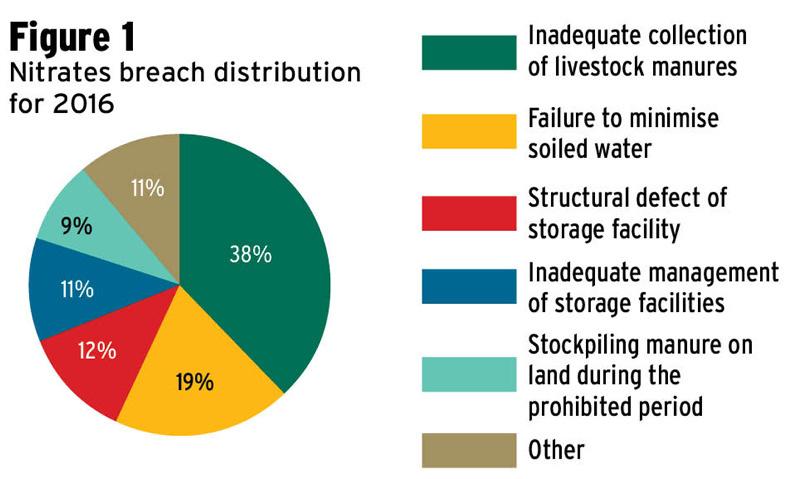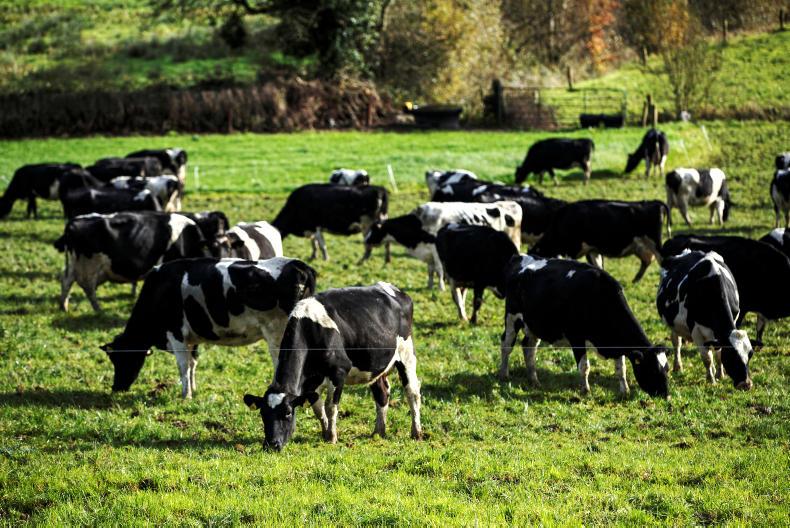Under EU regulations, the Department is required to carry out inspections annually.
Under the Single Payment Scheme (SPS), 5% of land must be checked for eligibility. Additionally, 1% of all applicants must be inspected under cross compliance, which includes inspections on nitrates, animal identification, pesticide use and animal welfare among many other areas.
The Department carries out the minimum amount of inspections required under EU regulations.
There is a certain criteria that will decide if a farmer will be inspected. First of all, between 20% and 25% of cases are selected from the entire population at random. The remainder of the cases are selected under risk analysis.

At a recent adviser training day, a Department spokesperson outlined that every year the risk changes when it comes to cross compliance breaches and that the inspections must focus on farmers who are at risk.
Risk analysis
The Department highlighted that dairy farmers who are currently expanding are more likely to breach nitrates regulations and therefore would be more at risk of an inspection.
The risk analysis results are reviewed annually, with the risk categories that perform poorly either dropped or amended and perhaps new categories added.
When assessing risk factors, such as land type, number and scales of enterprises, number of livestock and previous inspection history are taken into account.
Every non-compliance breach has weightings and sanctions associated with them, with more severe breaches leading to higher penalties.
According to the Department, negligence is the most common cross compliance breach. This can result in a sanction of 3% of the support payment. However, this can be increased to 5% or decreased to 1% depending on the extent, severity and permanence of the breach.
Where a breach is deemed to be intentional, then a penalty of 20% will generally be applied. However, this can be increased to 100% or decreased to 15% depending on the seriousness of the breach.
Distribution of nitrates breaches in 2016
In 2016, the largest nitrates breaches were for the inadequate collection of livestock manures, which resulted in 38% of breaches, with a failure to minimise soiled water accounting for 19% of breaches, according to the Department.
If an inspector comes to your farm, there are a number of areas that they will focus on. Firstly, they will examine if the farmer is minimising soiled water on their farm. They will also measure and check to see if all manure storage facilities are fit for purpose and if they meet the minimum manure storage requirements for the farm.
Inspections will involve examining where farmyard manure (FYM) and round bales are stored. FYM cannot be stockpiled on fields during the prohibited spreading period which runs until 12 January for Zone A, 15 January for Zone B and 31 January for Zone C.
Inspectors will also check if land spreading/buffer zones of chemical and organic fertilisers have been adhered to beside watercourses. It is important to note that the buffer zones for spreading organic fertilisers increases from 5m to 10m for the two weeks before and after the prohibited spreading period.
The Department will also check the accuracy of records and if they were submitted on time, including invoices for fertilisers. Inspectors will also examine when ploughing was carried out and the green cover in place.
Almost 60% of farmers fell foul of one or more cross compliance rules in 2016. Over half of these 2,533 farmers were forced to pay a penalty from their BPS.
Read more
Listen: ‘First of all he measured all the slurry tanks’ - inspection
Beef management: cross compliance checks
Under EU regulations, the Department is required to carry out inspections annually.
Under the Single Payment Scheme (SPS), 5% of land must be checked for eligibility. Additionally, 1% of all applicants must be inspected under cross compliance, which includes inspections on nitrates, animal identification, pesticide use and animal welfare among many other areas.
The Department carries out the minimum amount of inspections required under EU regulations.
There is a certain criteria that will decide if a farmer will be inspected. First of all, between 20% and 25% of cases are selected from the entire population at random. The remainder of the cases are selected under risk analysis.

At a recent adviser training day, a Department spokesperson outlined that every year the risk changes when it comes to cross compliance breaches and that the inspections must focus on farmers who are at risk.
Risk analysis
The Department highlighted that dairy farmers who are currently expanding are more likely to breach nitrates regulations and therefore would be more at risk of an inspection.
The risk analysis results are reviewed annually, with the risk categories that perform poorly either dropped or amended and perhaps new categories added.
When assessing risk factors, such as land type, number and scales of enterprises, number of livestock and previous inspection history are taken into account.
Every non-compliance breach has weightings and sanctions associated with them, with more severe breaches leading to higher penalties.
According to the Department, negligence is the most common cross compliance breach. This can result in a sanction of 3% of the support payment. However, this can be increased to 5% or decreased to 1% depending on the extent, severity and permanence of the breach.
Where a breach is deemed to be intentional, then a penalty of 20% will generally be applied. However, this can be increased to 100% or decreased to 15% depending on the seriousness of the breach.
Distribution of nitrates breaches in 2016
In 2016, the largest nitrates breaches were for the inadequate collection of livestock manures, which resulted in 38% of breaches, with a failure to minimise soiled water accounting for 19% of breaches, according to the Department.
If an inspector comes to your farm, there are a number of areas that they will focus on. Firstly, they will examine if the farmer is minimising soiled water on their farm. They will also measure and check to see if all manure storage facilities are fit for purpose and if they meet the minimum manure storage requirements for the farm.
Inspections will involve examining where farmyard manure (FYM) and round bales are stored. FYM cannot be stockpiled on fields during the prohibited spreading period which runs until 12 January for Zone A, 15 January for Zone B and 31 January for Zone C.
Inspectors will also check if land spreading/buffer zones of chemical and organic fertilisers have been adhered to beside watercourses. It is important to note that the buffer zones for spreading organic fertilisers increases from 5m to 10m for the two weeks before and after the prohibited spreading period.
The Department will also check the accuracy of records and if they were submitted on time, including invoices for fertilisers. Inspectors will also examine when ploughing was carried out and the green cover in place.
Almost 60% of farmers fell foul of one or more cross compliance rules in 2016. Over half of these 2,533 farmers were forced to pay a penalty from their BPS.
Read more
Listen: ‘First of all he measured all the slurry tanks’ - inspection
Beef management: cross compliance checks







 This is a subscriber-only article
This is a subscriber-only article










SHARING OPTIONS: